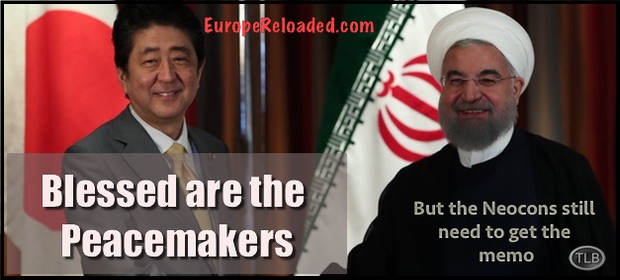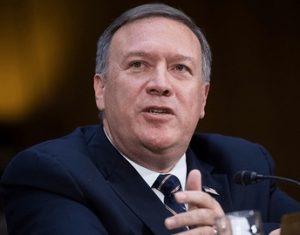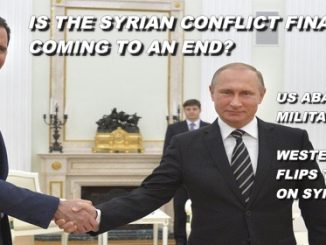
The US/Iran Crisis in the Light of the Rising Sun
We predicted it for a long time: the US would eventually fabricate a massive international crisis to provoke a war with Iran. The entire series of 911 wars and phoney revolutions over the last two decades have been mere preludes to the coming destruction of Iran.
Now, Japan finds itself at the centre of an escalating international crisis after the Americans blamed the June 13 attacks on two oil tankers in the Gulf of Oman on Iran, one owned by Norway and the other by Japan.

Norway has been an important mediator in Iran’s negotiations with the West, and Oslo, although a NATO member, often pursues discretely independent foreign policies. But in this article, I want to focus on Japan’s involvement in this crisis. What role is Japan likely to play in the US war on Iran?
Mike “We Lied-We-Cheated-We-Stole” Pompeo
US Secretary of State Mike Pompeo told CBS News yesterday that the US is sure Iran was behind the attacks. This is the same man who recently admitted that, as director of the CIA, he lied repeatedly. Anyone with a modicum of knowledge in international relations knows that the CIA is a lie-fabricating machine;  that it sells wars of aggression on lies; that its entire purpose is to control the perception of the masses in order to protect its elite paymasters. The CIA has always hated American citizens as much as their fake foreign “enemies”.
that it sells wars of aggression on lies; that its entire purpose is to control the perception of the masses in order to protect its elite paymasters. The CIA has always hated American citizens as much as their fake foreign “enemies”.
So, what is the US planning now? First, let’s consider the new geopolitical chessboard and its “strategic imperatives” to borrow a phrase from the late Zbigniew Brzezinski. The US no longer controls the Middle East; it no longer controls Latin America. The US has lost control of its own economy and is desperately trying under Trump to gain control over its own industry as China continues to expand its influence throughout the world. The US government under President Trump does not even control America.
Iran’s troublemaking around the world?
So let’s come back to Pompeo. What is he saying now? He’s saying that the US “knows” Iran is behind the attacks in the Persian Gulf and that the US does not need any authorisation to use force. That is what he said in his interview with CBS: the US can bomb and destroy any country in the world when its interests are under threat; its interests being the interests of the financial cabal that controls its government and directs its policy. We call that cabal Israel. What Pompeo is saying is that the US/ Israel is above the law. Israel is its own law and will attack anyone, anywhere, anytime at any cost. We should at least be grateful to Pompeo for making things official.
Pompeo also said, “This is a regime that has caused much trouble around the world.” Now consider this statement for a moment.
Did Iran attack America in 911? Did Iran invade and occupy Afghanistan? Did Iran invade and occupy Iraq? Did Iran start the Libyan war? Did Iran start the Syrian war? Did Iran start the phoney war on terror? Has Iran invaded and bombed over 50 countries since the second world war, most of whom were democracies, replacing their governments with dictatorial regimes? No. So whom is Pompeo referring to? He is referring to the United States of America!
The Japs are back!
We’ve all seen films of the Second World War depicting the Japanese as cruel, heartless tyrants enslaving the people of Asia. Although in many respects true, it is nevertheless a one-sided biased view of Japan’s complex geopolitical objectives during the Second World War.
Since their defeat in war, the Japanese have been subject to US power. They have rarely if ever disagreed with US policy in Asia. But in recent years, the world’s third-largest economic power has been flexing its muscles. Japan has been remilitarizing and has also been revising its history, in particular, its role during the Second World War. Japan saw itself as liberating Asia from the pernicious influence of British colonialism. In Japan’s view, Asia had been colonised to a large extent by Britain and France due to the weakness of Asian nations. Japan presented itself as the defender of the Mongoloid race against the dominance of the Caucasians. I am not attempting to defend Japanese imperialism, but it is important to understand that every country participating in both world wars had what it considered to be legitimate reasons for its actions, and vanquished powers never get to write their own history.
This new assertive role Japan is playing in the region has caused multiple problems with China.
In so far as Japanese historical revisionism threatens China, the US is not concerned. But allowing Japan to re-arm and not sanctioning its resurgent nationalism means that there is always a threat Japan could escape from the clutches of the US.
In several recent conflicts, Japan’s increasingly independent diplomacy has come to the fore.
During the destabilisation of Myanmar (ER: formerly Burma) in 2017, when Islamist groups backed by oligarchs in Saudi Arabia and the West unleashed a campaign of terror in Northern Rakhine State — attacks which international media blamed on the victims — the Japanese refused to condemn and isolate Naypyidaw. Instead, they discretely joined Russia and China in supporting the Burmese government’s attempt to de-escalate the crisis.
During the Second World War, Burma was a key strategic target of the Japanese Empire’s attempt to oust the British from Asia. Japan’s relations with the Burmese have remained cordial, in spite of US and European hostility.
In recent years, Japan has convened major conferences with African nations and has not hidden its ambition of rivalling China’s investments in the continent.
Shinzo Abe’s recent visit to Tehran was an attempt by Tokyo to mediate in Iran’s conflict with the United States. Since Prime Minister Yukio Hatoyama’s administration (2009-2010), Japan has been attempting to refocus its policies away from Americo-centrism towards increasing ties with Asian nations. Hatoyama’s government made important gestures towards improving relations with China. Although Shinzo Abe’s resurgent nationalism has admittedly worsened relations with China, it also poses problems for the United States because it is not always directed against China alone.
 The contradiction in Japan’s foreign policy was highlighted a few years ago by former Finance Minister Shoichi Nakagawa, who was close to Abe. He was deeply suspicious of China and staunchly pro-Taiwan, but he was equally suspicious of the United States. He also suggested that Japan should acquire nuclear weapons. Nakagawa was one of the few important Japanese officials to publicly condemn the dropping of atomic bombs on Nagasaki and Hiroshima by the United States at the end of the Second World War.
The contradiction in Japan’s foreign policy was highlighted a few years ago by former Finance Minister Shoichi Nakagawa, who was close to Abe. He was deeply suspicious of China and staunchly pro-Taiwan, but he was equally suspicious of the United States. He also suggested that Japan should acquire nuclear weapons. Nakagawa was one of the few important Japanese officials to publicly condemn the dropping of atomic bombs on Nagasaki and Hiroshima by the United States at the end of the Second World War.
The United States is the only country to have ever used nuclear weapons to murder a civilian population. The dropping of atomic bombs in Japan was justified on the grounds that it was the only way of stopping the war. But the Japanese had been attempting to negotiate peace with the United States since 1943, to no avail. The US was determined to use the atomic bomb in order to show the Soviets who the new masters of the world really were.
The outsourcing of US industry to Asia has meant that Japan, although in decline, has nonetheless gained in stature. With a strong industrial base and largely homogenous population, Japan still has the potential to play a leading role in Asian integration, provided it can maintain good relations with oil and gas-exporting nations.
On March 12, 2017, Saudi King Salmon bin Abdulaziz Al-Saud visited Tokyo, the first visit by a Saudi head of state in 5 decades. The two countries signed several high-level trade agreements as part of the inauguration of the Joint Vision 2030 project, which opened up the Saudi economy to Japanese high-tech investment in exchange for lucrative oil export deals to Japan. As Saudi Arabia undertakes a vast privatisation programme, Japan stands to gain by becoming a major partner in the diversification of the Saudi economy.
Although the Saudis are being blamed as possible suspects for the attacks in the Gulf of Oman, its culprits are most likely to the US and Israel. Influential Iraqi Shiia cleric Muqtada bin Sadr visited Jeddah, Saudi Arabia in April 2017, where he met with Prince Mohammed Bin Salmon with a view to improving Saudi relations with Shia Iraq and Iran. This suggests that the Saudis may also be seeking to de-escalate tensions with Iran.
Since the Fukushima disaster of 2011, Japan has been increasingly insecure about its energy security. The Fukushima disaster increased Japan’s reliance on Middle Eastern oil, thus forcing it to comply more with US policies toward the countries of that region.
George Friedman, the director of Stratfor, a US Think Tank close to the CIA, believes Japan will eventually escape from US control and could even become a US enemy. As a major maritime power, Japan is central to US control over the Pacific Region. Japan’s need to expand investments in developing economies is coming into conflict with the US/Israeli permanent war economy. Japan clearly does not want another major war in the Middle East, which could have a devasting impact on energy prices and security.
Iran’s culture of peace and resistance
When filming my documentary The Culture of Resistance for Press TV in 2017, I visited the Peace Museum in Tehran where I interviewed a Japanese woman who had moved to Tehran after experiencing the horrors of the US nuclear bombs in her country. She had married an Iranian man and remained in Iran all her life. Japan knows a thing or two about nuclear bombs; about the people who fabricate them and why they are used. The Peace Museum in Tehran is dedicated to the victims of US-backed wars against Iran, where chemical weapons were used, supplied by Germany and France with full US backing. The US would not hesitate to drop the bombs again.
 Former US National Security Adviser Zbigniew Brzezinski (pictured) told the US Foreign Relations Committee in 2007 that a war could be started, “by some provocation in Iraq or a terrorist act in the U.S. blamed on Iran; culminating in a “defensive” U.S. military action against Iran that plunges a lonely America into a spreading and deepening quagmire, eventually ranging across Iraq, Iran, Afghanistan, and Pakistan.”
Former US National Security Adviser Zbigniew Brzezinski (pictured) told the US Foreign Relations Committee in 2007 that a war could be started, “by some provocation in Iraq or a terrorist act in the U.S. blamed on Iran; culminating in a “defensive” U.S. military action against Iran that plunges a lonely America into a spreading and deepening quagmire, eventually ranging across Iraq, Iran, Afghanistan, and Pakistan.”
Patrick Clawson told the Washington Institute in September 2012 that if Iran refused to bow to US pressure, a false flag operation could be envisaged to start a war.
No one believes Mike Pompeo’s lies about the oil tanker attacks. But what the war in Iraq proved is that the neocons did not care anymore whether or not the public believed them. They just needed a cover story. The Japanese government has said it is not convinced that Iran was behind the oil tanker attack. The US provocations may backfire as China and Japan deepen ties with Iran. If there is one thing China, Japan and Iran all agree on, it is that the US does not have the right to bomb any country anywhere whenever it pleases. President Trump loves borders. The US military should concentrate on protecting its own borders and leave the rest of the world alone.
************
Original article
••••
The Liberty Beacon Project is now expanding at a near exponential rate, and for this we are grateful and excited! But we must also be practical. For 7 years we have not asked for any donations, and have built this project with our own funds as we grew. We are now experiencing ever increasing growing pains due to the large number of websites and projects we represent. So we have just installed donation buttons on our websites and ask that you consider this when you visit them. Nothing is too small. We thank you for all your support and your considerations … (TLB)
••••
Comment Policy: As a privately owned web site, we reserve the right to remove comments that contain spam, advertising, vulgarity, threats of violence, racism, or personal/abusive attacks on other users. This also applies to trolling, the use of more than one alias, or just intentional mischief. Enforcement of this policy is at the discretion of this websites administrators. Repeat offenders may be blocked or permanently banned without prior warning.
••••
Disclaimer: TLB websites contain copyrighted material the use of which has not always been specifically authorized by the copyright owner. We are making such material available to our readers under the provisions of “fair use” in an effort to advance a better understanding of political, health, economic and social issues. The material on this site is distributed without profit to those who have expressed a prior interest in receiving it for research and educational purposes. If you wish to use copyrighted material for purposes other than “fair use” you must request permission from the copyright owner.
••••
Disclaimer: The information and opinions shared are for informational purposes only including, but not limited to, text, graphics, images and other material are not intended as medical advice or instruction. Nothing mentioned is intended to be a substitute for professional medical advice, diagnosis or treatment.
••••
Click on the image below to visit TLB Project on twitter …




